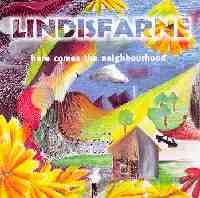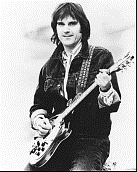Six questions to Sid Griffin regarding his work as producer of "Here Comes The Neighbourhood" |
 |
Six questions to Sid Griffin regarding his work as producer of "Here Comes The Neighbourhood" |
 |

Who is Sid Griffin ?
Sid is currently ring leader of the Coal Porters, solo performer, writer and producer. He is a regular contributor to Mojo, Q and Country Music Int. and has been published in The Guardian. An acknowledged expert on the musical career of Gram Parsons, Sid has written a book, Gram Parsons - A Music Biography (Sierra Books) and has contributed sleeve notes to several reissues by Gram, The Flying Burrito Bros, The Byrds and Gene Clark. Sid has also written sleevenotes for reissues by The Everly Brothers, Phil Ochs, Iggy Pop and Nils Lofgren, and for various compilations.
For more details, please have a look at SID GRIFFIN's home page, maintained by Phil Dennison.
RG: Sid, why did Lindisfarne choose you to produce their first studio albums since years.
Sid: Surely you would have to ask the Lindisfarne band that, not me! I know they liked my solo album Little Victories a great deal but other than that ask Lindisfarne why I was chosen.
RG: Why did you go into the Highlands of Scotland to record the album ?
Sid: This Highland studio was where the band's previous recording was done, an EP [Blues from The Bothy], and they were very happy with the studio, its sounds and the engineer Nick Turner who is a really, really, really wonderful and talented guy. Lindisfarne chose the studio, not me. Having said that I thought it was a great choice and I would work there again sometime.
RG: Sid, remember the time you spent with the band. What influence would you say that came from you within your role as the producer ?
Sid: My influence ? Well, I think it was to keep things moving forward and to keep an overall view of where the sessions where headed. If something wasn't working it was my decision to say "this isn't good, let's stop and do something else now." I always had a guy recording with another Lindisfarne member practising his part for his turn in a few minutes with a third guy on stand by to practise is part for recording later on in the hour or whatever.
Besides that I rehearsed the songs with them at pre-production meetings in Newcastle weeks and weeks before we even went to record the album in Scotland. This was to pick the best songs and arrange their very best songs in a concise and flowing manner. I also asked the band to keep things acoustic and they agreed. I told them to stay away from loud, distorted electric guitar, loud drums and the saxophone in particular as they would distract from the reflective mood of the album as a whole. Listening back to the album I think I was right and I hope you agree.
RG: I suppose, you read my review. There you can read that I agree a 100%. It's not like 'back to their roots', it's much more one step back and two steps forward. We are no longer in the 70's !! This was the first time you worked with Lindisfarne (apart from the fact that Ian Thomson was one of the founding members in 1989 when The Coal Porters were formed in L.A. (together with Greg Sowders who played the drums)). Could you imagine to do some additional work wit the Lads ? Sid: Certainly Lindisfarne will be recording more albums if this one sells as much as we would like. Whether or not I will have the pleasure of producing them again I do not know. I sure hope so, but again that is up to the guys in Lindisfarne and not me. I certainly would like to produce them again, I do know that. It was a wonderful experience, they are very talented guys.
RG: One specific question concerning the fiddle. Rod Clements got a credit for playing it, but no matter how hard I tried, I was not able to discover on what track(s) he used it. Sid: Listen closely to the mix on some of the tags! Rod didn't want his fiddle any louder. You can ask Rod or Ray who is playing on what track. It isn't hard to figure out, drums were always Ray, Ian was always playing the bass, etc. within any of the tracks.
RG: One final question. I'm not the only person who thinks that the duration of the CD is a bit short. All of their fans were waiting for so long and then, after 43:50 min.of wonderful music, it's over too soon. We can't compare to the live recordings, Back and Fourth with 38:31 was even less, but that was long before the possibilities of a CD. So what was the reason for putting no more pieces of music on 'Neighbourhood' ? Sid: 80 minutes is the maximum capacity of a CD, but very few acts are going to have enough material to effectively fill this with a single album. It also asks a lot of the listener to expect that much of their time for a single album. I don't have any statistics to justify this, but I think 45 minutes is pretty average for a new release. In my collection CDs are getting slightly longer, but usually only between 45 and 50 minutes, which makes them awkward to tape! [Indeed. I copied 'Neighbourhood' on both sides of a 90-min tape for listening in my car (R.Groll) ]. The record isn't short, it is 43 minutes or so. Sgt. Pepper is 30 minutes flat, Pet Sounds in 29 minutes. Now those are short albums. Putting 72 minutes of music on a CD like Oasis did on 'Be Here Now' is just silly, hardly any act ever has 72 minutes of good music in them at a time!
RG: And even Lindisfarne does !! You want some samples ? Cropredy: 67 min., Another Fine Mess: 76 min., Caught In The Act: 71 min., Untapped and Acoustic: 65 min. just to name the non-collection CD's and still if you listen to those Lindisfarne music you feel them being too short.
However Sid, thanks for spending the time to respond to my questions (which were sent to him via his web-site).
Nov. 98, Reinhard Groll